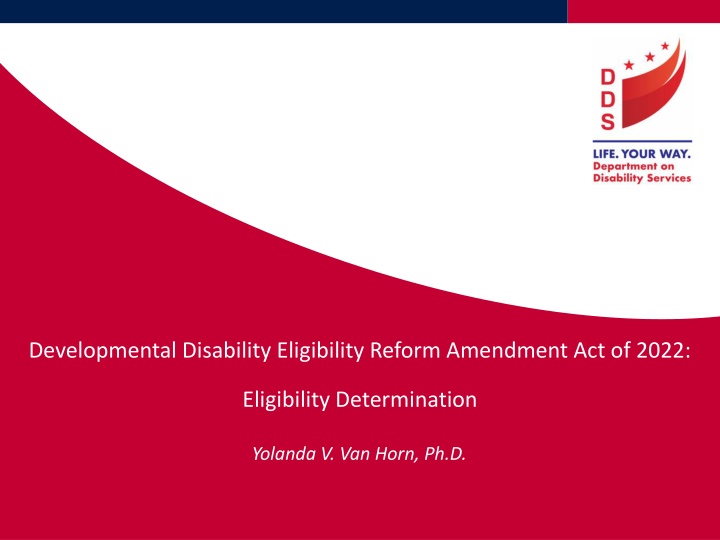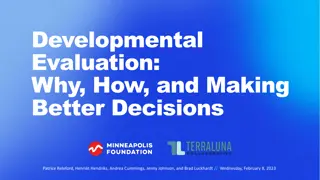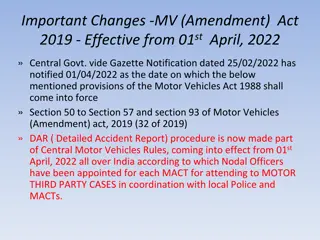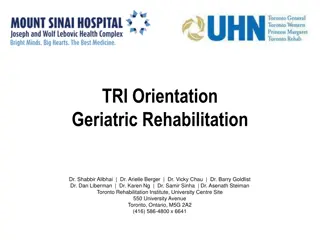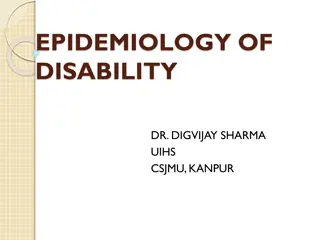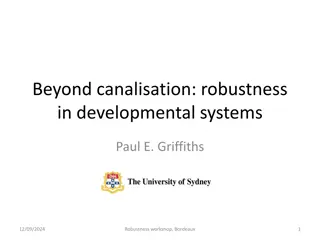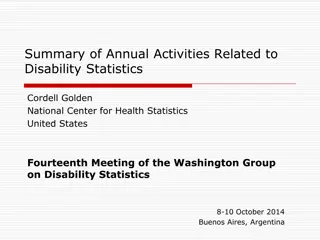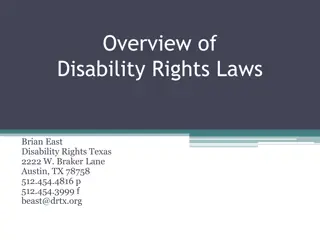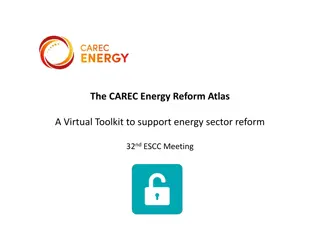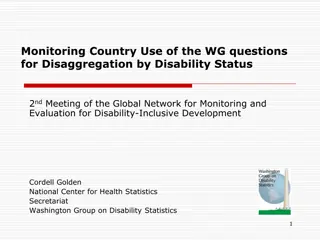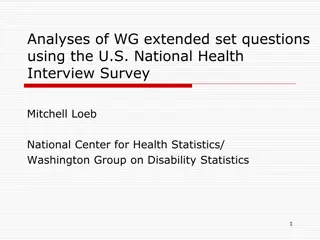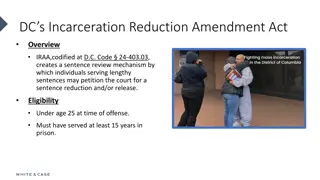Developmental Disability Eligibility Reform Amendment Act of 2022 Overview
The Developmental Disability Eligibility Reform Amendment Act of 2022 introduces new definitions, eligibility criteria, and expands services for individuals with developmental disabilities. It defines intellectual disability, developmental disability, and introduces substantial functional limitations as eligibility criteria. The act encompasses a range of developmental disabilities such as ADHD, Autism Spectrum Disorder, and Down Syndrome. It outlines new eligibility criteria based on the DSM-5-TR definition of intellectual disability, which includes deficits in intellectual functioning, adaptive functioning, and onset during the developmental period.
Download Presentation

Please find below an Image/Link to download the presentation.
The content on the website is provided AS IS for your information and personal use only. It may not be sold, licensed, or shared on other websites without obtaining consent from the author.If you encounter any issues during the download, it is possible that the publisher has removed the file from their server.
You are allowed to download the files provided on this website for personal or commercial use, subject to the condition that they are used lawfully. All files are the property of their respective owners.
The content on the website is provided AS IS for your information and personal use only. It may not be sold, licensed, or shared on other websites without obtaining consent from the author.
E N D
Presentation Transcript
Developmental Disability Eligibility Reform Amendment Act of 2022: Eligibility Determination Yolanda V. Van Horn, Ph.D.
Developmental Disability Eligibility Reform Amendment Act of 2022 Defines Intellectual Disability Defines Developmental Disability Introduces Substantial Functional Limitations Expands DDS services to people with all developmental disabilities CDC Examples of Developmental Disabilities ADHD Autism Spectrum Disorder Cerebral Palsy Down Syndrome Intellectual Disability Muscular Dystrophy Tourette s Syndrome Fragile X Syndrome
Whats New Review New definitions: Intellectual Disability (DSM) Developmental Disability Review New eligibility criteria: Substantial Functional Limitations
Criterion A: DSM-5-TR Definition of Intellectual Disability Deficits in intellectual functioning Criterion B: Deficits in adaptive functioning Criterion C: Onset of intellectual and adaptive deficits during the developmental period
DSM-5-TR Definition of Intellectual Disability Criterion A: Deficits in intellectual functioning Individuals with intellectual disability have IQ scores around 70, including a margin for measurement error (generally + 5 points). This involves a score range of 65-75 (70 + 5). Clinical training and judgment are required to interpret test results and assess intellectual performance. DSM-5-TR p. 38
DSM-5-TR Definition of Intellectual Disability Criterion C: Onset of intellectual and adaptive deficits during the developmental period Criterion C, onset during the developmental period, means that intellectual and adaptive deficits are present during childhood or adolescence. DSM-5-TR p. 42
DSM-5-TR Definition of Intellectual Disability Criterion B: Deficits in adaptive functioning Criterion B is met when at least one domain of adaptive functioning conceptual, social, practical - is sufficiently impaired that ongoing support is needed in order for the person to perform adequately across multiple environments, such as home , school, work and community. Adaptive functioning is assessed using both clinical evaluation and individualized, culturally appropriate, psychometrically sound measures. DSM-5-TR p. 42
Definition: Developmental Disability (3A) Developmental disability means a severe and chronic disability of a person that: (A) Is attributable to a mental or physical impairment, other than the sole diagnosis of mental illness, or to a combination of mental and physical impairments; (B) Is manifested before 22 years of age; (C) Is likely to continue indefinitely; (D) Results in substantial functional limitations in 3 or more of the following areas of major life activity: (i) Self-care; (ii) Understanding and use of language; (iii) Functional academics; (iv) Social skills; (v) Mobility; (vi) Self-direction (vii) Capacity for independent living; or (viii) Health and safety; and (E) Reflects the person s need for a combination and sequence of special, interdisciplinary, or generic services, individualized supports, or other forms of assistance that are of lifelong or extended duration and are person-centered, planned, and coordinated.
Level of Need Assessment and Screening Tool (LON): Criteria for Substantial Functional Limitations in 3 or more Major Life Activities Self -Care 3 or greater in Personal Care Understanding and Use of Language 1 or greater in Communication Social Skills 3 or greater in Social Life Functional Academics Refer to Psychological Evaluation Mobility 1 or greater in Mobility Capacity for Independent Living 2 or greater in Daily Living Health and Safety 2 or greater in Health AND 2 or greater in Safety Self-Direction 1 or greater in Comprehension and Understanding The LON is an assessment that will allow DDS to determine the person s support needs in an equitable and consistent manner based on interviews, observations and records
Eligibility Determination Level of Need Assessment and Screening Tool- (LON) How it Works The LON identifies: The areas or major life activities where the person needs support How much support the person needs to manage a health condition or to successfully perform an activity or skill. The LON is completed by the Eligibility Determination Unit team during the case review process. The LON is completed based on interviews, observations and supporting documentation: School Records Vocational Assessments OT, PT, Speech Evaluations Psychological Evaluations Psychiatric Evaluations Medical Records The EDU team will also interview the person (if possible) and supporters to get information about the person s functional capabilities and support needs.
Eligibility Determination Functional Skills Interview How it Works 1. The Functional Skills Interview asks open ended questions about the functional capabilities and support needs of people with disabilities ages 12 adult. 2. This interview assesses needs across multiple settings including home, day setting, community, and work setting. 3. The Interview assesses skills and needs for support in 9 areas: 5. Peer relationships, Socialization, and Social 1. Leisure/Recreation Communication 2. Career/ Employment 6. Community Participation 3. Self-Determination/Advocacy 7. Mobility 4. Health and Safety 8. Home Living 9. Transportation
Eligibility Determination Functional Skills Interview How it Works The EDU service coordinator will interview one or more informants who know the person well and will interview the person, if possible, using open-ended interview questions in 9 skill areas. People who might be interviewed: Parent Person Partner/Spouse/Roommate Job coach Case manager (HSCSN) Employer School staff
Eligibility Determination Level of Need Assessment and Screening Tool (LON) Functional Skills Interview Functional Skills Substantial Functional Limitations in 3 or more areas of major life activities: (1) Self-care (2) Understanding and use of language (3) Functional academics (4) Social skills (5) Mobility (6) Self-direction (7) Capacity for independent living (8) Health and safety 1) Leisure/Recreation 2) Career path and employment 3) Self-determination/advocacy 4) Health and safety 5) Peer relationships, socialization and social communication 6) Community participation 7) Mobility 8) Home living 9) Transportation Supporting Documents Direct Observations
